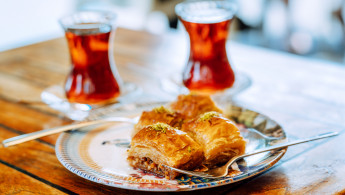Tea culture in Azerbaijan, Turkey enters UNESCO list
The culture of tea practised in both Turkey and Azerbaijan was on Thursday added to UNESCO's Intangible Cultural Heritage list, recognised as a symbol of "identity, hospitality and social interaction".
Black tea, taken at all hours of the day across Turkey, is traditionally prepared in small samovars, and served in small, tulip-shaped glasses that can be cupped in the palm of the hand.
The UN's cultural organisation acknowledged the ceremony's strong social significance in its statement announcing the decision.
"Tea culture in Azerbaijan and Turkiye is an important social practice that shows hospitality, builds and maintains social ties, and is used to celebrate important moments in the lives of communities," it said.
It is taken in bazaars across the country, where tea-sellers still walk the streets of cities serving the drink to traders and their customers on metal trays.
🔴 BREAKING
— UNESCO 🏛️ #Education #Sciences #Culture 🇺🇳 (@UNESCO) December 1, 2022
The culture of Çay (tea), a symbol of identity, hospitality and social interaction, has just been inscribed on the #IntangibleHeritage List.
Congratulations #Azerbaijan 🇦🇿 & #Türkiye 🇹🇷!
ℹ️ https://t.co/n5nd2IeXWb #LivingHeritage pic.twitter.com/AfN0np9VOj
In some parts of Azerbaijan, UNESCO noted, people add spices and herbs such as cinnamon, ginger and thyme.
"Tea culture is an essential part of daily life for all layers of society, providing a strong sense of cultural identity," said the UNESCO statement.
Among the other traditional practices the UN acknowledged on Thursday was the "traditional tea processing techniques and associated social practices" in China.
The tea drunk in Turkey is for the most part harvest in the hills of the northeast of the country overlooking the Black Sea.
Turkey's famous coffee was acknowledged on the UNESCO list back in 2013, but the founder of modern Turkey, Mustafa Kemal Ataturk encouraged the drinking of tea to support national production.





 Follow the Middle East's top stories in English at The New Arab on Google News
Follow the Middle East's top stories in English at The New Arab on Google News


